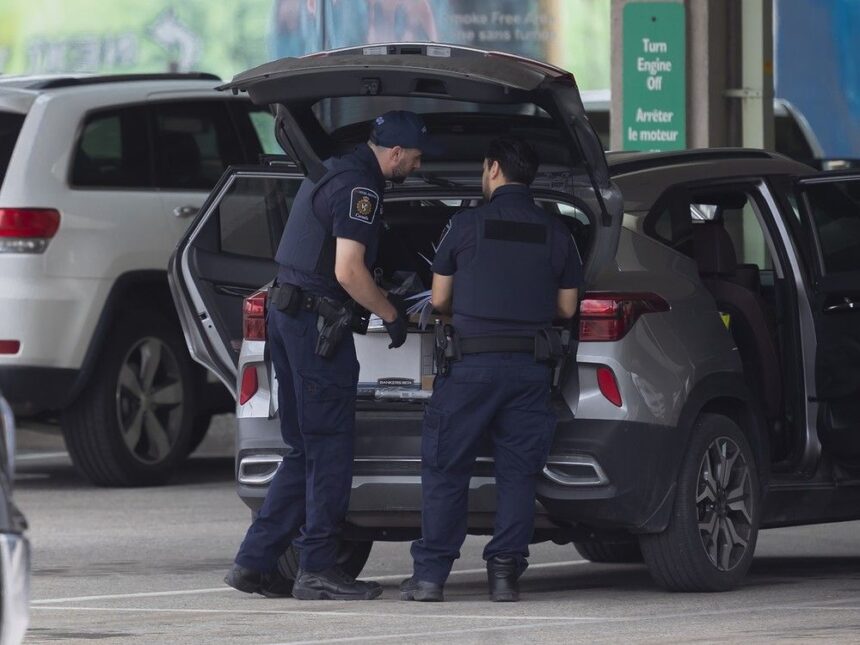In an alarming revelation that casts a shadow over Canada’s security apparatus, employees at both the Canada Border Services Agency (CBSA) and the Canadian Security Intelligence Service (CSIS) have expressed profound dissatisfaction with their workplace environments, according to the latest federal public service survey. The findings paint a troubling picture of Canada’s frontline security organizations, where officers tasked with protecting our borders and gathering intelligence face mounting internal challenges.
The 2023 Public Service Employee Survey, released earlier this week, indicates that a mere 43 percent of CBSA employees would recommend their organization as a “great place to work” – a figure significantly below the federal average of 62 percent. Perhaps more concerning is the statistic from CSIS, where only 47 percent of intelligence officers would endorse their workplace, highlighting systemic issues within both critical security agencies.
“These results shouldn’t surprise anyone who’s been paying attention to the chronic understaffing and resource constraints facing our security services,” said Dr. Veronica Marlowe, a public administration expert at the University of Toronto. “When frontline workers who safeguard national security feel unsupported, we need to recognize this as a potential vulnerability in our security infrastructure.”
The survey reveals specific pain points that transcend both organizations. At the CBSA, only 41 percent of respondents believed they had opportunities for career advancement, while just 40 percent felt senior management effectively communicated organizational priorities. CSIS fared only marginally better, with employees expressing similar concerns about leadership transparency and career development pathways.
More troubling still are indicators regarding workplace harassment and discrimination. Approximately 19 percent of CBSA employees reported experiencing harassment within the past year, compared to 11 percent across the broader federal public service. At CSIS, 15 percent of staff reported similar experiences, pointing to cultural issues that persist despite public commitments to workplace improvement.
The timing of these findings is particularly significant as both agencies face unprecedented operational demands. The CBSA continues to manage complex immigration challenges at ports of entry, while CSIS confronts evolving threats ranging from foreign interference to domestic terrorism. These elevated pressures appear to be exacerbating workplace strains, according to Canada News analysis of the survey data.
“When security professionals are stretched thin and feel underappreciated, it creates conditions where institutional effectiveness can deteriorate,” noted former CSIS intelligence analyst Martin Chen in an interview with CO24 News. “The risk isn’t just unhappy employees – it’s the potential impact on Canada’s security posture.”
In response to the survey, both organizations have issued statements acknowledging the results and pledging workplace improvements. CBSA spokesperson Elizabeth Fortier indicated that the agency is “developing a comprehensive action plan to address key areas of concern,” while CSIS has announced the formation of an employee wellness task force aimed at tackling specific workplace issues.
However, labor representatives remain skeptical. Jean-Pierre Fortin, president of the Customs and Immigration Union, characterized the responses as “predictable bureaucratic language that fails to acknowledge the severity of the situation.” He further emphasized that “without significant structural changes and proper resource allocation, we’ll be discussing these same issues next year.”
The implications extend beyond workplace satisfaction into the realm of national security effectiveness. Research consistently demonstrates connections between employee engagement and organizational performance, raising questions about whether these workplace challenges could impact operational capabilities at Canada’s security agencies.
As government officials review these findings, the fundamental question emerges: can Canada afford to maintain this status quo within its security apparatus? With evolving global threats and domestic security challenges, the wellbeing of those on the frontlines of Canadian security deserves more than perfunctory acknowledgment – it demands meaningful action. What price might Canadians ultimately pay if these workplace concerns remain unaddressed?























